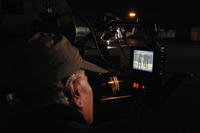Marine Corps officers received a challenge to come up with a "disrupter" or "game changer" to alter the typical plans presented in public forums to penetrate the defenses of a countries such as China, Iran or even Syria. Lt. Gen. Richard Mills, commander of Marine Corps Combat Development Command, wants his Marines to become "party crashers."
Corps officials launched Expeditionary Warrior 2012, the service's Title 10 War Game, Monday, where Marine officers as well as those from other services will discuss different combat scenarios. Mills told the military officers and industry officials to think hard about sea basing, command and control, cyber threats and working with civilian agencies.
Eager to pull Marines out of the extended land war the Corps has fought in Iraq and Afghanistan, Marine leaders have stressed the importance of returning to their nautical roots. Mills said he wanted the officers to consider the implications of launching attacks from ships in anti-access/area denial scenarios. He sees this as the Corps' future highlighted by recent operations in Libya.
Anti-access/area denial continues to be the buzzword swirling around Washington as service leaders sit on Capitol Hill and justify their budgets. It's much tougher to sell Congress on pricey stealth or long range weapons if too much emphasis is placed on battlefields seen in Iraq and Afghanistan. The success of relatively low-tech drones flying with ease over Afghanistan does not help the Marine Corps make its case for the Joint Strike Fighter's survival.
Retired Marine Corps Lt. Gen. Chip Gregson, former head of U.S. Marine Forces Pacific, posted a Google Earth image of China's southern coast, as he spoke at an Anti Access/Area Denial panel that followed Mills' opening comments. He was quick to caution not to equate China with the second coming of the Soviet Union, but the Marine Corps leadership's focus on the Pacific remains steadfast.
An Air Force lieutenant colonel who works on Air Staff asked after the panel why such a focus remains on China when an extended conventional war seems so unlikely between the two nuclear capable countries whose economies depend on each other. Each of the four panelists said a war is unlikely, but contended the U.S. military must be ready. This of course flies in the face of Defense Secretary Leon Panetta's comments on Capitol Hill that the military is not planning for the much more likely sequestration, but that's another story entirely.
Navy Rear Adm. Terry Kraft, commander of the Navy Warfare Development Command, said he worried most about losing the communications edge the U.S. enjoys if it takes on a near-peer military. Leaders will lose that "1,000 mile screwdriver" if a cyber attack takes down the military's communications network, Kraft said. He instructed the services to spend more time teaching their junior leaders to operate without it.
Retired Rear Admiral Alan B. Hicks, the formerAegis Ballistic Missile Defense program director, used the Stuxnet virus and it's attack on Iran's uranium enrichment facilities as an example of the growing power of cyber attacks. Hicks is the leader that challenged the room of officers to think outside the box because the enemy knows traditional U.S. techniques and will exploit them.
What's sure to be a popular topic throughout the war game is "distributed operations." Leaders have harped on this concept of small teams of Marines infiltrating enemy lines sort of similar to a special warfare group would.
These could be the "party crashers" that Mills said the Marine Corps must become to keep up with modern warfare.








